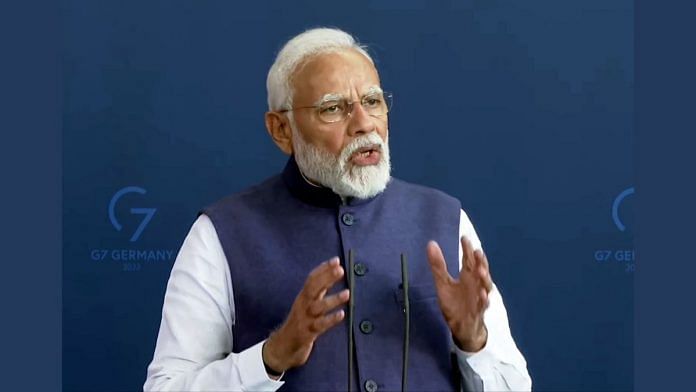Prime Minister Narendra Modi has been making clarinet calls of reaching out, particularly significant since these come at a time when tempers have been flaring and the mood is grim. After reaching out to the Sikh community and the youth of Kashmir, the PM inaugurated the 90th anniversary celebrations of Sivagiri pilgrimage where he said, ‘as Indians, the people of the country had only one caste i.e. Indianness’.
He also updated his past slogan for 2022 (and for 2024): Sabka Saath, Sabka Vikas, Sabka Vishwas, and Sabka Prayas.
Modi’s outreach through ‘sabka saath, sabka vikas’ has remained consistent. In 2019, the slogan was expanded to include trust and this thought of inclusiveness resonated with the masses, so much so that it became India’s ‘Golden Tweet’ of 2019. The emphasis once again being about “together we will build a strong and inclusive India”. He instructed his MPs towards earning people’s trust.
But has anybody been listening and making the effort? Has any MP truly worked on fulfilling the PM’s mission? On ground, the saath, the vikas, the vishwas and prayas have gone astray.
This has been India’s problem. Our sincerity and resoluteness go for a toss, the determination is abandoned at the altar of politics, something that seldom happens in other democratic countries. In South Africa, a Truth and Reconciliation Commission was established to address the post-apartheid challenges. Germany too made concentrated and sincere efforts to atone for the crimes of Hitler. Konrad Adenauer played an instrumental role in rehabilitating Germany’s international reputation by reconciling with Nazi victims and acknowledging the atrocities Germany had committed. So much so that the horror has been memorialised – Memorial to the Murdered Jews of Europe, also known as the Holocaust Memorial — one that is unblinking and unflinching in its honesty.
It’s something that India needed in the aftermath of Partition. But we suffer from a non-reconciliation syndrome, for instead of acknowledging the division, the governments that came and went knowingly and unknowingly only broadened these division lines. The rift, to date, remains un-addressed, and hatred between Hindus and Muslims prevails.
Jenine di Giovanni, journalist who witnessed and reported the destruction in Bosnia, Chechnya and other places, wrote: “In the aftermath of any war or genocide, healing and reconciliation are ultimate aspirations.”
It is thus strange and shocking that in 75 years, India never thought of undergoing the process of reconciliation. Neither by politicians, leaders, activists, or by gurus and clerks. Rather, hatred kept being pumped repeatedly. Pain has been allowed to swirl. The 14 Prime Ministers never made it part of their legacy to reduce the tension and the misbeliefs between Hindus and Muslims. No political efforts were made to bring the two communities together. Rather, whitewashing the fissures and keeping the cracks open for vilification and political gains has become the norm.
Undeniably, the sense of security has been destroyed, keeping the possibility of a coherent, ‘Indianness’ narrative disrupted.
Also read: BJP’s divide-and-rule plan is working – Hate is now fully automated, led by youth
Reconciliation requires goodwill
One effort towards reconciliation was made on 5 August 2019, when the Modi government presented the bill for Abrogation of Article 370 in Parliament. The fervour with which it was presented and the passion with which the word ‘inclusive’ was invoked, there was a sense of psychological rather than political. But three years later, Kashmir remains alienated because the government never really made ‘inclusivity’ a ground reality. To make Kashmir the atoot ang of India, the institutional framework or the approach for reaching out, for reconciliation, has not happened. The Pandits of the Valley haven’t gotten their closure nor the woes of the Muslims been addressed yet.
Instead of making a committee of Pandits and Muslims, bringing them together on a table and enabling the process of accepting, healing and moving forward, The Kashmir Files was made. A movie that informed the uninformed but initiated no dialogue between the two communities, stretching out the division even more. Kashmir can never become the atoot ang of India until both the communities become the atoot neighbours first.
But reconciliation today has once again been pushed out by politics, for politics.
Therefore, the concern is when the Prime Minister has made his objective so clear and open over the last eight years, why has ‘sabka saath, sabka vikas’ added with vishwas and prayas not trickled down? It is not easy, particularly when so much water has passed under the bridge, but India’s priority right now is to begin the process of reconciliation, to make it the permanent requirement for governance.
PM Modi will complete eight years in office this month. His evocation of hope provides him to build a legacy where he could truly become the unifying figure of ‘Indianness’. Yet, his challenge continues to be operationalising all of this into action on the ground. His desire to do right, to fulfil the responsibilities of his time as he sees them, to spread inclusivity and reconciliation, is being undermined by the men and their policies.
The author is a journalist based in New Delhi. She tweets @shrutiv_vyas. Views are personal.
(Edited by Prashant)



